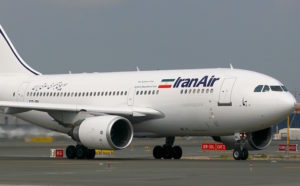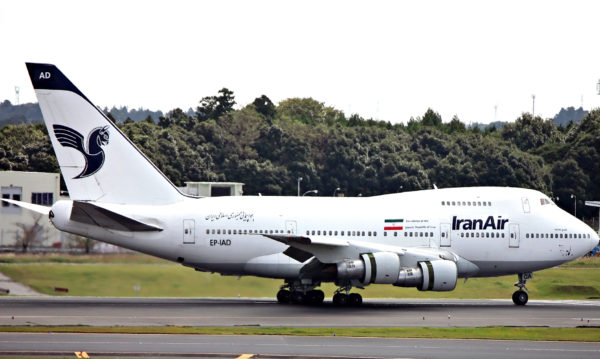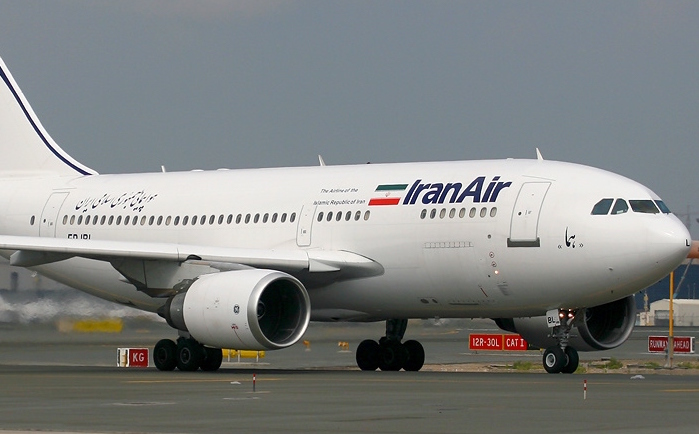angelburst29
The Living Force
A series of unconfirmed reports ...
Ex-Iranian President Ahmadinejad Alleged Arrested for Inciting Protest
https://sputniknews.com/middleeast/201801071060580048-ex-iranian-prez-arrested-reports/
A series of unconfirmed reports allege that the former Iranian president had been detained and placed under house arrest following allegations that he either supported or incited unrest that has rocked the Middle Eastern nation since late December 2017.
Allegations were published Saturday by the London-based media outlet Al-Quds Al-Arabi citing what they termed "reliable sources in Tehran."
Ahmadinejad, while visiting the western Iranian city of Bushehr on December 28, was quoted by the news outlet stating that "Some of the current [Iranian] leaders live detached from the problems and concerns of the people, and do not know anything about the reality of society," cited by the Times of Israel.
The former Middle Eastern leader — in office 2005-2013 — is alleged by the newspaper to have implied that the current administration in Tehran is a government of "mismanagement" and that current Iranian President Hassan Rouhani's officials "believe that they own the land and that the people are an ignorant society," according to Timesofisrael.com.
A quick response by Rouhani's government has seen hundreds of protesters arrested and the creation of well-attended pro-government rallies in Tehran and other cities.
Government officials in Tehran have blamed the unrest on foreign meddling, particularly on US, Saudi Arabian, and Israeli actors.
IRGC Thanks Iranian People, Security Forces for Countering New Sedition
http://english.almanar.com.lb/421540
In a statement released on Sunday, the IRGC praised the people, the Law Enforcement Force, the Basij (mobilization) Force and the intelligence forces of the country for preventing a new sedition and foiling the plots hatched against the Islamic Republic by “the US, Britain, the Zionist regime (of Israel), Al Saud, MKO terrorists and monarchists”.
The IRGC further described recent demonstrations held to condemn riots in the country as “a great epic” and said it proved that the grandeur of the Iranian nation is eternal.
Iranians Rally for 5th Day in Support of Islamic Establishment
http://english.almanar.com.lb/421507
The mass rallies on Sunday took place in the cities of Shahr-e Kord and Mahabad in western Iran despite heavy snowfall, as well as in the cities of Yazd and Qazvin.
The protesters held national flags and chanted pro-government slogans as they denounced the acts of sedition and violence in the country.
Over the past few days, Iranians have staged similar demonstrations across the country following scattered riots held in some towns and cities, which followed a series of peaceful protests over economic issues.
Law enforcement forces and ordinary people intervened to put an end to the violence after vandals and armed elements launched attacks on public property, mosques and police stations.
A police spokesman said on Sunday that a total of 20 people had been killed in the violence, adding the main plotters of the unrest had been identified and arrested.
Iran’s Rezaei: US Plotted Latest Unrest in Erbil
http://english.almanar.com.lb/421298
“The scenario designed by MKO members, monarchists, and US put into practice in Iran in recent days was plotted months earlier in Erbil of Iraq,” said Rezaei, referring to Mojahedin-e-Khalq Organization, branded as a terrorist organization in Iran.
“Some months ago the CIA head of Special Activities Division (SAD), held a meeting in Erbil with the Chief of staff of (former Iraqi dictator) Saddam Hussein’s son, Qusay, Saddam’s brother-in-law, Barzanis’ representative, MKO representatives, and Saudi Arabian agents,” the Iranian official raid in remarks carried by Mehr News Agency.
“In this meeting, the date and time for the operation was defined,” he added, “it was agreed to start in late December, using the cyber space, and to follow the scenario of toppling the establishment in January and February, with operation codenamed as ‘the Strategy of Resultive Convergence’,”
Rezaei added.
“They imagined they could usurp the control of all cities from the appointed officials to get to the second phase and import weapons into Iran to kill some civilians and then in the next phase US would table new anti-Iran sanctions in the UNSC through human rights committee to ease the way for entrance of MKO members,” he said, according to Mehr.
Russia Calls for Closed-door Talks ahead of UN Meeting on Iran
http://english.almanar.com.lb/420858
Moscow condemned Washington for interfering in Iranian affairs and opposed discussion of the demonstrations at the top UN body.
UN Meeting A ‘Sad Attempt’ by US to Sell Same Old Lies to World: US Analyst
https://www.tasnimnews.com/en/news/2018/01/07/1620948/un-meeting-a-sad-attempt-by-us-to-sell-same-old-lies-to-world-us-analyst
“The UNSC urgent meeting that was called by the US is a sad attempt by US UN envoy Nikki Haley to continue to try and sell the same old lies to the United Nations, and scare them into action using propaganda,”
Bennett is a US Army Special Operations Officer (11th Psychological Operations Battalion, Civil Affairs-Psychological Operations Command), and a global psychological warfare-counterterrorism analyst, formerly with defense contractor Booz Allen Hamilton. He received a Direct Commission as an Officer, held a Top Secret/Sensitive Compartmentalized Information (TS/SCI) security clearance, and worked in the highest levels of international counterterrorism in Washington DC and MacDill Air Force Base in Tampa, Florida. He has developed and managed psychological warfare theories, products, and operations for US Special Operations Command, US Central Command, the State Department Coordinator for Counterterrorism, and other government agencies.
The following is the full text of the interview. (At site.)
Iran Bans English in Primary Schools - Reports
https://sputniknews.com/middleeast/201801071060575104-iran-bans-english-primary-schools/
The head of the state-run High Education Council, Mehdi Navid-Adham, said to local TV on Sunday that English classes in primary schools are "against laws and regulations." He added that English was no longer part of the educational curriculum. High school students will keep learning English, the official added.
According to Mehdi Navid-Adham, primary schools will now focus on the Farsi language and classes of Iranian culture.
The news comes after an announcement from Iran’s Revolutionary Guard Corps regarding recent protests. The Revolutionary Guard declared that the demonstrations had been orchestrated with the help of external forces, including the United States and Britain, and had been successfully suppressed.
Earlier in January, Iranian Ambassador to the United Nations Gholam Ali Khoshroo said during an emergency UN Security Council meeting that Tehran had "hard evidence" proving protests were "directed from abroad." The meeting was called by the US, which has repeatedly accused Iranian authorities of cracking down on pro-democracy protesters.
Reports of the ban have already aroused reaction on social networks.
Ex-Iranian President Ahmadinejad Alleged Arrested for Inciting Protest
https://sputniknews.com/middleeast/201801071060580048-ex-iranian-prez-arrested-reports/
A series of unconfirmed reports allege that the former Iranian president had been detained and placed under house arrest following allegations that he either supported or incited unrest that has rocked the Middle Eastern nation since late December 2017.
Allegations were published Saturday by the London-based media outlet Al-Quds Al-Arabi citing what they termed "reliable sources in Tehran."
Ahmadinejad, while visiting the western Iranian city of Bushehr on December 28, was quoted by the news outlet stating that "Some of the current [Iranian] leaders live detached from the problems and concerns of the people, and do not know anything about the reality of society," cited by the Times of Israel.
The former Middle Eastern leader — in office 2005-2013 — is alleged by the newspaper to have implied that the current administration in Tehran is a government of "mismanagement" and that current Iranian President Hassan Rouhani's officials "believe that they own the land and that the people are an ignorant society," according to Timesofisrael.com.
A quick response by Rouhani's government has seen hundreds of protesters arrested and the creation of well-attended pro-government rallies in Tehran and other cities.
Government officials in Tehran have blamed the unrest on foreign meddling, particularly on US, Saudi Arabian, and Israeli actors.
The Islamic Revolution Guards Corps (IRGC) expressed gratitude to the Iranian people as well as the country’s security forces for foiling the enemies’ attempts to incite sedition in the Islamic Republic.
IRGC Thanks Iranian People, Security Forces for Countering New Sedition
http://english.almanar.com.lb/421540
In a statement released on Sunday, the IRGC praised the people, the Law Enforcement Force, the Basij (mobilization) Force and the intelligence forces of the country for preventing a new sedition and foiling the plots hatched against the Islamic Republic by “the US, Britain, the Zionist regime (of Israel), Al Saud, MKO terrorists and monarchists”.
The IRGC further described recent demonstrations held to condemn riots in the country as “a great epic” and said it proved that the grandeur of the Iranian nation is eternal.
Iranians have taken to the streets in several cities for a fifth straight day to express their faith in the Islamic establishment and condemn recent riots in some parts of the country.
Iranians Rally for 5th Day in Support of Islamic Establishment
http://english.almanar.com.lb/421507
The mass rallies on Sunday took place in the cities of Shahr-e Kord and Mahabad in western Iran despite heavy snowfall, as well as in the cities of Yazd and Qazvin.
The protesters held national flags and chanted pro-government slogans as they denounced the acts of sedition and violence in the country.
Over the past few days, Iranians have staged similar demonstrations across the country following scattered riots held in some towns and cities, which followed a series of peaceful protests over economic issues.
Law enforcement forces and ordinary people intervened to put an end to the violence after vandals and armed elements launched attacks on public property, mosques and police stations.
A police spokesman said on Sunday that a total of 20 people had been killed in the violence, adding the main plotters of the unrest had been identified and arrested.
Secretary of Iran’s Expediency Council, Mohsen Rezaei revealed on Saturday details of what he called latest events “scenario”, noting that the unrest which the Islamic Republic had witnessed last week was plotted by the United States in Kurdistan’s Erbil.
Iran’s Rezaei: US Plotted Latest Unrest in Erbil
http://english.almanar.com.lb/421298
“The scenario designed by MKO members, monarchists, and US put into practice in Iran in recent days was plotted months earlier in Erbil of Iraq,” said Rezaei, referring to Mojahedin-e-Khalq Organization, branded as a terrorist organization in Iran.
“Some months ago the CIA head of Special Activities Division (SAD), held a meeting in Erbil with the Chief of staff of (former Iraqi dictator) Saddam Hussein’s son, Qusay, Saddam’s brother-in-law, Barzanis’ representative, MKO representatives, and Saudi Arabian agents,” the Iranian official raid in remarks carried by Mehr News Agency.
“In this meeting, the date and time for the operation was defined,” he added, “it was agreed to start in late December, using the cyber space, and to follow the scenario of toppling the establishment in January and February, with operation codenamed as ‘the Strategy of Resultive Convergence’,”
Rezaei added.
“They imagined they could usurp the control of all cities from the appointed officials to get to the second phase and import weapons into Iran to kill some civilians and then in the next phase US would table new anti-Iran sanctions in the UNSC through human rights committee to ease the way for entrance of MKO members,” he said, according to Mehr.
Russia on Friday requested closed-door talks ahead of a UN Security Council meeting called by the United States to discuss violent protests in Iran, diplomats said.
Russia Calls for Closed-door Talks ahead of UN Meeting on Iran
http://english.almanar.com.lb/420858
Moscow condemned Washington for interfering in Iranian affairs and opposed discussion of the demonstrations at the top UN body.
A former US army psychological warfare officer and counter-terrorism analyst described a recent UN Security Council meeting on Iran’s protests as a “sad attempt” by the US to continue to sell the “same old lies” to the UN.
UN Meeting A ‘Sad Attempt’ by US to Sell Same Old Lies to World: US Analyst
https://www.tasnimnews.com/en/news/2018/01/07/1620948/un-meeting-a-sad-attempt-by-us-to-sell-same-old-lies-to-world-us-analyst
“The UNSC urgent meeting that was called by the US is a sad attempt by US UN envoy Nikki Haley to continue to try and sell the same old lies to the United Nations, and scare them into action using propaganda,”
Bennett is a US Army Special Operations Officer (11th Psychological Operations Battalion, Civil Affairs-Psychological Operations Command), and a global psychological warfare-counterterrorism analyst, formerly with defense contractor Booz Allen Hamilton. He received a Direct Commission as an Officer, held a Top Secret/Sensitive Compartmentalized Information (TS/SCI) security clearance, and worked in the highest levels of international counterterrorism in Washington DC and MacDill Air Force Base in Tampa, Florida. He has developed and managed psychological warfare theories, products, and operations for US Special Operations Command, US Central Command, the State Department Coordinator for Counterterrorism, and other government agencies.
The following is the full text of the interview. (At site.)
Iran's Supreme Leader Ali Khamenei has reportedly said that early learning of the English language paves the way for the West's "cultural invasion" of Iran.
Iran Bans English in Primary Schools - Reports
https://sputniknews.com/middleeast/201801071060575104-iran-bans-english-primary-schools/
The head of the state-run High Education Council, Mehdi Navid-Adham, said to local TV on Sunday that English classes in primary schools are "against laws and regulations." He added that English was no longer part of the educational curriculum. High school students will keep learning English, the official added.
According to Mehdi Navid-Adham, primary schools will now focus on the Farsi language and classes of Iranian culture.
The news comes after an announcement from Iran’s Revolutionary Guard Corps regarding recent protests. The Revolutionary Guard declared that the demonstrations had been orchestrated with the help of external forces, including the United States and Britain, and had been successfully suppressed.
Earlier in January, Iranian Ambassador to the United Nations Gholam Ali Khoshroo said during an emergency UN Security Council meeting that Tehran had "hard evidence" proving protests were "directed from abroad." The meeting was called by the US, which has repeatedly accused Iranian authorities of cracking down on pro-democracy protesters.
Reports of the ban have already aroused reaction on social networks.



